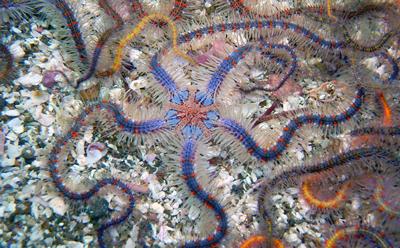

| Online: | |
| Visits: | |
| Stories: |

| Story Views | |
| Now: | |
| Last Hour: | |
| Last 24 Hours: | |
| Total: | |
How Species Extinction Affects Complex Ecosystems
Research by the University of Southampton has found that methods used to predict the effect of species extinction on ecosystems could be producing inaccurate results. This is because current thinking assumes that when a species vanishes, its role within an environment is lost too.
However, scientists working on a new study have found that when a species, (for example a group of sea creatures), is wiped out by a catastrophic event, other species can change their behaviour to compensate, exploiting the vacant role left behind. This leads to positive or negative effects on ecosystems, and in turn, either better or worse outcomes than current estimates would suggest.
At present, predictions assume that any contribution is completely lost at the point of extinction -leading to a decline in ecosystem performance.
The findings are published in the journal Scientific Reports. Lead author Matthias Schmidt Thomsen, of Ocean and Earth Science at the University of Southampton, says: “We have known for some time that a reduction in biodiversity has negative ecological consequences, but predictions of what happens to an ecosystem have not accounted for the occurrence of compensatory responses.”
He added: “Our study provides evidence that the response of surviving species to novel circumstances can, at least partially, offset, or indeed exacerbate, changes in an ecosystem that are associated with species removal.”
The researchers based their findings on the interaction of species in a community of invertebrates (such as clams, shrimps and worms) obtained from marine seabed samples collected in Galway Bay, Ireland. Bottom dwelling marine organisms are particularly vulnerable to extinction because they are often unable to avoid disturbance. These organisms are important because they churn up sediments from the bottom of the ocean, a process known as ‘bioturbation’, playing a vital role in returning nutrients to surrounding water as food for other creatures.
Using mathematical simulations, the team were able to explore what happens to the bioturbation process as species are removed from the system under different extinction scenarios. The simulations also accounted for the nuances of how other creatures would react as circumstances change. The direction and strength of response depends on the type of compensation and the extinction scenario.
Co-author, Dr Clement Garcia, an ecologist from the Centre for Environment, Fisheries and Aquaculture Science in Lowestoft said “There have been concerns over the gradual erosion of our natural habitat for some time. These findings will help resolve some of the detail that has previously been unavailable, allowing us to better identify both vulnerabilities and opportunities that coincide with environmental change and human endeavour.”
The team’s findings have important implications for the conservation of biological resources and habitat, and will support the refinement of models that are used to predict the consequences of human activity and environmental change.
Peter Franklin
Citation: ’Consequences of biodiversity loss diverge from expectation due to compensatory responses‘ by Matthias S. Thomsen, Martin Solan, Jasmin A. Godbold, Clement Garcia, Stefan G. Bolam and Ruth Parker, Scientific Reports DOI: 10.1038/ :



